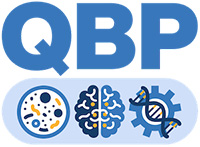Program Information
- BE 605: Molecular Bioengineering
- BE 606: Quantitative Physiology
- BE 604: Statistics & Numerical Methods
- BE 559: Foundations of Biomedical Data Science and Machine Learning OR BE 562: Computational Biology
Required Courses
There are four core required courses in quantitative biology and physiology for all QBP fellows:
The QBP program also requires three additional courses in areas of quantitative and engineering-based systems biology and physiology (overview of all relevant courses included in the table below). Please select two courses from the first three columns and one from the Scale-Independent column.
| Molecular & Genetic Engineering | Cellular-to-Tissue Level Engineering | Tissue-to-Organ Level Engineering | Scale-Independent Analysis & Modeling |
|---|---|---|---|
| BE 500 (Tomic): Introduction to Systems Immunology: Bridging Immunology and Engineering BE 500 (Dunlop/Morgan): Introduction to Biological Feedback Control BE 556: Optical Spectroscopic Imaging BE 560: Biomolecular Architecture BE 562: Computational Biology BE 564: Biophysics of Large Molecules BE 566: DNA Structure and Function BE 567: Nonlinear Systems in Biomedical Engineering BE 568: Systems Biology of Human Disease BE 700 (Ngo): Chemical and Physical Methods for Determining the Molecular Organization of the Cell BE 704: Cancer Biology and Oncology for Engineers BE 745: Nanomedicine BF 768: Biological Data Base Design BI 645: Cellular and Molecular Neurophysiology |
BE 500 (Tomic): Introduction to Systems Immunology: Bridging Immunology and Engineering BE 500 (Dunlop/Morgan): Introduction to Biological Feedback Control BE 504: Polymers and Soft Materials BE 517: Optical Microscopy of Biological Materials BE 521: Continuum Mechanics for Biomedical Engineers BE 533: Biorheology BE 549: Structure and Function of the Extracellular Matrix BE 555: Introduction to Biomedical Optics BE 556: Optical Spectroscopic Imaging BE 567: Nonlinear Systems in Biomedical Engineering BE 700 (Khalil): Methods and Logic in Quantitative Biology BE 704: Cancer Biology and Oncology for Engineers BE 707: Quantitative Studies of Excitable Cells BE 709: From Cells to Tissue – Engineering Structure and Function BE 726: Fundamentals of Biomaterials BE 727: Principles and Applications of Tissue Engineering BE 771: Introduction to Neuroengineering BE 772: Neuroengineering Devices BE 773: Advanced Optical Microscopy BI 645: Cellular and Molecular Neurophysiology |
BE 508: Quantitative Studies of Respiratory and Cardiovascular Systems BE 524: Skeletal Tissue Mechanics BE 567: Nonlinear Systems in Biomedical Engineering BE 570: Introduction to Computational Vision BE 710: Neural Plasticity and Perceptual Learning BE 726: Fundamentals of Biomaterials BE 727: Principles and Applications of Tissue Engineering BE 771: Introduction to Neuroengineering BE 772: Neuroengineering Devices BE 788: Soft Tissue Biomechanics |
BE 500 (Dunlop/Morgan): Introduction to Biological Feedback Control BE 500 (Galagan): Programming Fundamentals for BME Data Analysis with Python BE 504: Polymers and Soft Materials BE 511: Biomedical Instrumentation BE 515: Introduction to Medical Imaging BE 519: Speech Signal Processing BE 521: Continuum Mechanics for Biomedical Engineers BE 533: Biorheology BE 559: Foundations of Biomedical Data Science and Machine Learning BE 562: Computational Biology BE 567: Nonlinear Systems in Biomedical Engineering BE 703: Numerical Methods and Modeling in BME BE 747: Advanced Signals and Systems for BME MA 565: Math Models in the Life Sciences |
Rotation Labs
Students must perform a minimum of three and are encouraged to perform four lab rotations. The rotations must in the laboratories listed in Table B below which span four levels of biology and physiology inclusive of a level termed “behavioral or integrative”. Students must select from at least three distinct laboratories and ensure these selections cover at least three distinct columns. Moreover, note that several laboratories are listed in multiple columns. This occurs because these faculty members are engaged in research projects that span several biological levels. Students must show that a rotation in a lab for a particular column engaged the student in experiences associated with that column’s theme. This rotation system ensures that QBP fellows experience biology over multiple scales, regardless of which laboratory they select for their dissertation topic. Please note that this table changes every year as new faculty members arrive. Please consult with Prof. John White for any questions regarding laboratory selections.
| Molecular Labs |
Cellular Labs | Tissue Labs | Organ Labs |
|---|---|---|---|
Albro, Michael
Banskota, Samagya
Bigio, Irving
Boas, David
Chen, Chris
Chen, Jerry
Cleary, Brian
Densmore, Doug
Dunlop, Mary
Economo, Michael
Galagan, James
Green, Alex
Grinstaff, Mark
Han, Xue
Hao, Liangliang
Jimenez, Miguel
Joseph-McCarthy, Diane
Khalil, Ahmad “Mo”
Klapperich, Catherine
Mertz, Jerome
Nia, Hadi
O’Shea, Timothy
Pratt, Erica
Roblyer, Darren
Smith, Michael
Teplensky, Michelle
Tomic, Adriana
White, John
Wong, Joyce
Wong, Wilson
Zaman, Muhammad
Albro, Michael
Banskota, Samagya
Bigio, Irving
Boas, David
Chen, Chris
Chen, Jerry
Cheng, Ji-Xin
Cleary, Brian
Connizzo, Brianne
DePasquale, Brian
Densmore, Doug
Devor, Anna
Dunlop, Mary
Economo, Michael
Galagan, James
Green, Alex
Grinstaff, Mark
Han, Xue
Hao, Liangliang
Jimenez, Miguel
Joseph-McCarthy, Diane
Khalil, Ahmad “Mo”
Klapperich, Catherine
Mertz, Jerome
Morgan, Elise
Nia, Hadi
O’Shea, Timothy
Pratt, Erica
Roblyer, Darren
Sen, Kamal
Smith, Michael
Suki, Bela
Teplensky, Michelle
Tomic, Adriana
White, John
Wong, Joyce
Wong, Wilson
Zaman, Muhammad
Albro, Michael
Bigio, Irving
Boas, David
Chen, Chris
Chen, Jerry
Cheng, Ji-Xin
Connizzo, Brianne
DePasquale, Brian
Devor, Anna
Economo, Michael
Galagan, James
Green, Alex
Grinstaff, Mark
Han, Xue
Hao, Liangliang
Jimenez, Miguel
Khalil, Ahmad “Mo”
Klapperich, Catherine
Mertz, Jerome
Morgan, Elise
Nia, Hadi
O’Shea, Timothy
Pratt, Erica
Roblyer, Darren
Sen, Kamal
Smith, Michael
Stepp, Cara
Stangl, Matthias
Suki, Bela
Teplensky, Michelle
Tomic, Adriana
White, John
Wong, Joyce
Wong, Wilson
Zaman, Muhammad
Bigio, Irving
Boas, David
Chen, Chris
Cheng, Ji-Xin
Connizzo, Brianne
DePasquale, Brian
Devor, Anna
Grinstaff, Mark
Mertz, Jerome
Morgan, Elise
Roblyer, Darren
Sen, Kamal
Stepp, Cara
Stangl, Matthias
Suki, Bela
Tomic, Adriana
Program Cohesion, Retention, Enhancement and Information Flow
The program cohesion and cultural components include: monthly journal club and dinners, active involvement in annual retreats and participation on our Annual Symposium in Quantitative Biology and Physiology run by and for QBP, SB2, BFP and TRB fellows. Each trainee beyond their third year in the BME program gives a talk at the symposium.
